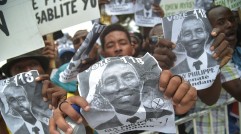How An Unpaid Bakery Debt Started the Revolutionary Pastry War
Over 175 years ago, France and Mexico engaged in a culinary-inspired war sparked by a dispute over baked goods. The historic battle raged on from 1838 - 1839 and was named "the Pastry War."
In 1838, Mexico was still striving to gain its foothold after it declared freedom from Spain in 1821. The first 20 years of independence saw a tumultuous government that led Mexico to become a lawless land during the 1828 campaign between presidential candidates Manuel Gómez Pedraza and Vicente Guerrero Saldaña. The chaotic situation had many French nationals to suffer constant harassment from Mexican soldiers.
Repaying Debts
Remontel was a French pastry chef on the outskirts of the town of Tacubaya. He was renowned for his cream puffs and other delectable goods. While the locals praised Monsieur Remontel's baked products, the Mexican officers constantly harassed the pastry maker. In 1832, his bakery was allegedly destroyed by drunken army forces.
The Mexican government ignored his attempt at requesting payment for the damage caused by the troops. The angry baker bypassed the French diplomatic corps and went directly to King Louise Philippe of France to ask for assistance. The French government, who had already received many complaints from other French nationals, demanded a compensation of 600,000 pesos-60,000 of which will go to Monsieur Remontel.
Mexico, who then owed a debt to other European nations, rejected the request. In spring of 1838, the French government sent out a naval fleet. It blockaded vital docks along the Gulf of Mexico and the Rio Grande. The navy bombarded the island fortress of San Juan de Ulua in Veracruz on November 27, 1838, forcing the Mexican government to declare war.
The Pastry War
Former military general Antonio Lopez de Santa Anna lived near the Mexican fortress in Veracruz during the attack. The government called upon him to lead over 3,200 soldiers to fight the French at Veracruz. Santa Anna immediately organized a makeshift army aimed to drive the French troops back to their ships.
Learning of the plans of the Mexican army, the opposition responded by landing 1,500 troops led by the French King's third son, 20-year-old Prince Francois de Joinville. The prince caught the Mexican army off guard when they launched an attack on a military compound. Sensing defeat, Santa Anna fled to a monastery that served as army barracks.
The Mexican army regrouped and attacked the French soldiers but was defeated by the amount of artillery fire that came from the French fleet. Grapeshot fired from one of the cannons severely injured one of Santa Anna's legs. He and his army evacuated Veracruz. The doctors amputated the general's limb, which he buried at his hacienda.
The British government offered their assistance to help mediate and end the violence on both sides. They dispatched a squadron and an ambassador to the Gulf of Mexico. Richard Pakenham, the British mediator, used his connections within the Mexican political circle to broker a peace agreement between the warring countries.
On March 9, 1839, Mexico paid France the hefty sum of 600,000 pesos while France withdrew its army forces from the country. Monsieur Remontel was compensated and allowed to continue selling his pastries to his Mexican customers.
Want to read more? Check these out:
Subscribe to Latin Post!
Sign up for our free newsletter for the Latest coverage!











